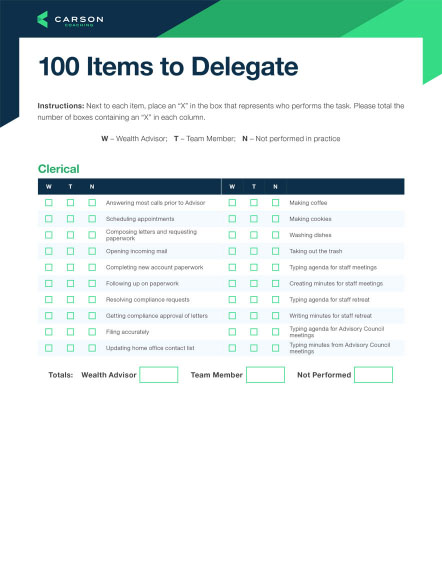In a perfect world, you could build a firm sustained by a steady stream of new clients – a majority of whom were referrals. A simple “ask and you shall receive” would play out with existing clients.
Many advisors have a system in place to proactively collect and pursue referrals. They know when and how to ask for referrals from clients. But to take your dedication to growth and serving clients to the next level, you need more than a proactive program.
While friends and family are excellent prospects, you can obtain stronger and warmer connections than traditional referrals by building relationships with centers of influence (COIs).
Meaningful, productive relationships with accountants, attorneys and other professionals can be the launch pad for significant A+ client growth. COIs work with clients who you know are willing to work with professionals to manage their needs. Like you, they also work with clients on personal topics like finance and legal proceedings.
These topics can overlap and create opportunities for referrals. COI relationships are mutually beneficial. One of your clients might be going through a divorce – you recommend an attorney. Months later that attorney might send one of their clients your way. This establishes an exchange of pre-qualified introductions. But this is just the first of two levels of COI relationships – and not necessarily the most effective. That title belongs to strategic COI partnerships.
Let’s learn more about the two tiers of COI relationships, the requirements and rewards of each and how you can maximize your COI relationships and reach the second tier.
Straight referral relationships
Ideally, both the advisor and the COI give and receive referrals to and from each other, creating a mutually beneficial relationship. Too often though, these relationships are lopsided. The advisor gives the COI a consistent flow of referrals but receives few or no referrals in return.
This first tier of COI relationships doesn’t require heavy involvement or effort beyond establishing the initial relationships. But the lack of payout can be frustrating compared to the second tier.
Strategic partnerships
The second tier of COI relationships requires more consistent work, but the work is rewarded, because you’re more likely to close on leads. Strategic COI partnerships are more integrated than straight referral relationships.
Every wealthy client needs three legs to their financial stool: an attorney, an accountant, and a financial planner/wealth manager. By creating strategic partnerships, advisors, attorneys and accountants better serve clients in a more integrated planning model.
The advisor becomes part of the COI’s planning team. The COI and advisor work together to achieve greater, more seamless solutions for high net worth clients. In this relationship, COIs don’t just provide referrals, they create their own planning solutions to dovetail with the appropriate offerings of the advisor.
Unlike traditional referrals, not every advisor will fit the requirements needed to establish COI relationships. If you’re going to work with attorneys and CPAs, you’ll need organized processes and high-level technical skill, or risk credibility issues. Good enough isn’t good enough when working with attorneys and accountants.
To develop meaningful strategic COI partnerships, you need to demonstrate your expertise, as well as your commitment to be part of an integrated team. Let’s explore each step in detail.
1. Demonstrate your value
Host events that provide real value to the potential COIs and result in straight referral relationships. (Remember, these first-tier relationships are often lopsided, but are a great stepping stone.) An example of an event would be continuing education courses or other expertise and relationship building sessions. The Carson team of executive business coaches can help you think of other value-driven events, especially as the coronavirus has moved most events online.
2. Show your commitment to be a team member
Review the COI relationships you have and select a few that you can deepen and strengthen into strategic partnerships. How can you tell which relationships have the potential?
Expertise is important to look for here. You also need to consider culture and value alignment. An advisor-COI relationship needs to be in sync to make it a seamless experience for clients. This step can take awhile to achieve as these relationships take time to develop.
Once you’re settled into a strategic partnership with a COI, you have to work to maintain its effectiveness. Continue to demonstrate your value and show your commitment to being an integrated team. You can add value to your strategic partners through idea sharing. Communicate your service model and value proposition to the COIs so they know how to talk about you and your firm to their clients.
Strategic COI partnerships aren’t quid pro quo – they’re about providing value to clients with an integrated approach. Referrals are essential to growth both in the traditional sense and via COI relationships. The more effort and intention you put into building strong COI relationships, the more likely you will receive stronger prospects.
Unsure of whether your firm has the processes in place to curate COI relationships? Or maybe you’re not seeing the results you want from your COI relationships? Work with a Carson Coach to help uncover blindspots and provide the accountability you need to build the right relationships. Schedule a complimentary call with a coach today.



